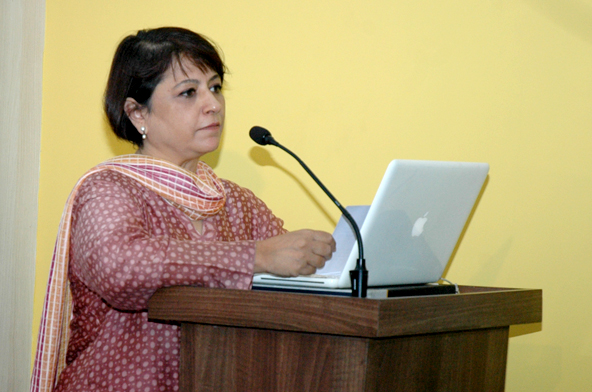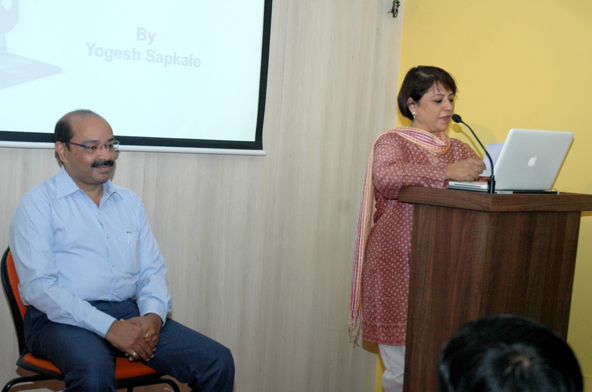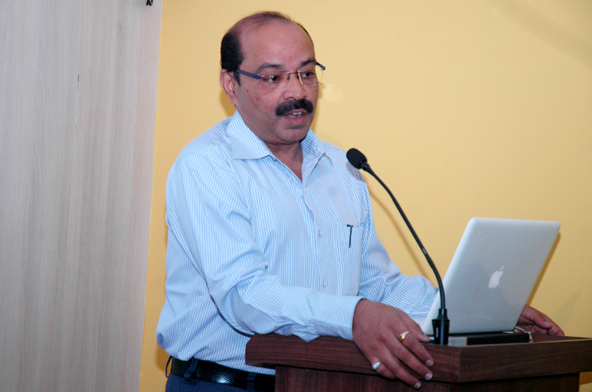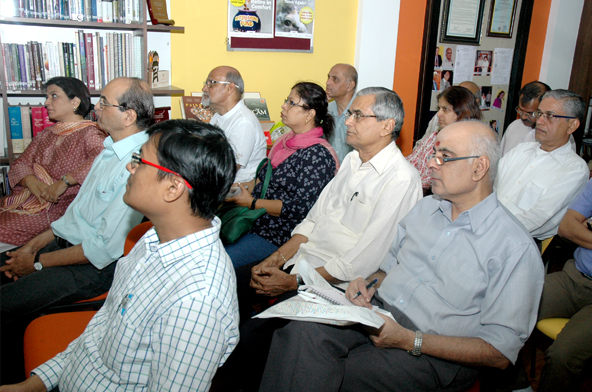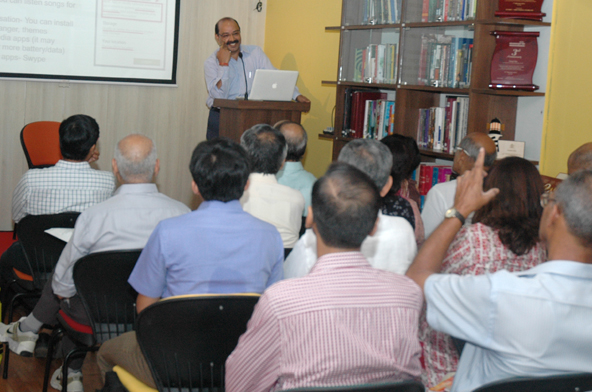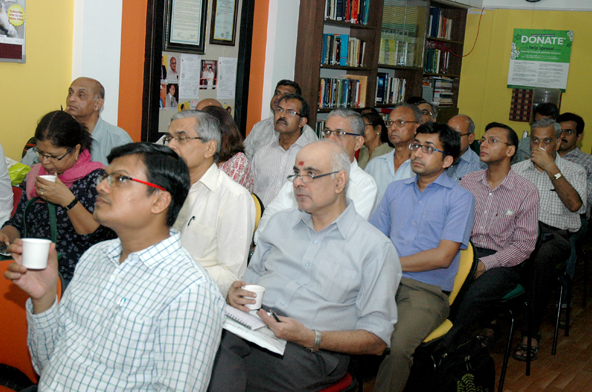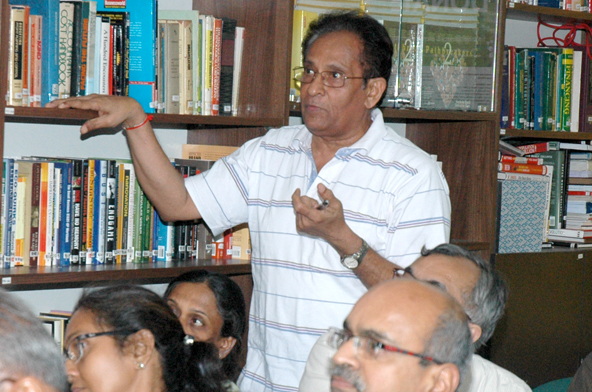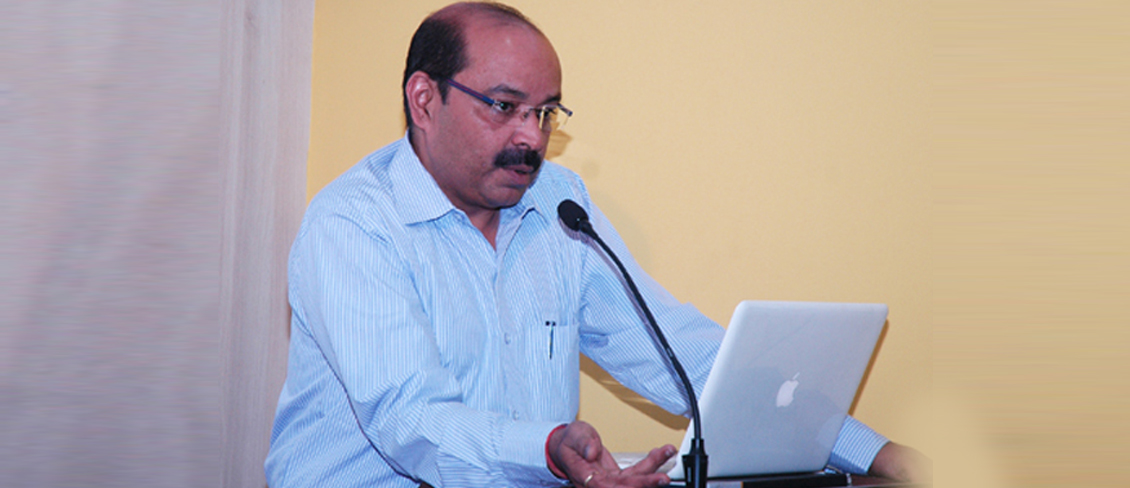
“Online transactions and shopping through mobile or personal computer (PC) or laptop are fast becoming way of life. No doubt it makes like easy. However, if you want to take advantage of technology, you need to follow certain rules,” said Yogesh Sapkale, Deputy Editor of Moneylife. He was speaking on “How to be Safe & Smart in Digital Financial Transactions” at Moneylife Foundation which explained how some basic safeguards could allow people to benefit from technological advances without falling prey to scams, viruses and malware.
He said, “No software or mobile app can protect you if you are not careful. Whether you are using Internet for browsing, checking emails or online transactions you need to follow certain rules. It applies while using mobile phones and ATMs as well.”
Mr Sapkale started the session with mobile security, what apps to download or install, how to save contacts and the importance of having an emergency (ICE) contact number in the mobile. “This (the ICE number) will help in case something happens with you and your near and dear ones needed to be contacted. You can save number with ICE prefix, like ICE Rahul, ICE Pankaj and so on.”
Mr Sapkale offered an interesting solution to those who keep their phones locked. “Locking your mobile is a good thing to prevent unauthorised usage. But it becomes problem in case of emergency, especially if you are knocked out in an accident. A person who wants to assist you or contact your kin is unable to access details from a locked phone”. His solution was this: Almost all mobile devices allow you to post owner information on the locked screen. Instead of posting your name under this, add the mobile number of the person who should be contacted in case of emergency. Use the prefix ‘ICE’ (in case of emergency) or ‘Emergency’ followed by the mobile number of the person. You can add the name of the person if you wish. You can also add more than one number, but use mobile numbers instead of landlines: ICE 9876543210 or Emergency 1234567890.
This will help others to help you.”
He then told the audience how one could block spam or unwanted calls and messages using apps like TrueCaller. Such apps would get access to your contact list, but it also helps in identifying the caller, he said, adding, for this, TrueCaller needs to have access to internet or you need to keep the data connection, preferably 3G and above on.
Mr Sapkale also informed the audience about precautions to take while handing over you mobile for repairing or while selling it to someone else. Emphasising on regular backups, he advised the audience to sell or dispose of mobile only after taking all back up and resetting the device to factory setting.
He then offered some safety tips for using internet banking and financial transactions. He said, “Do check the encryption level of the URL which you may be accessing, especially for financial transactions. There should be an additional ‘s’ in the address bar, like https. Also check for the lock icon in the address bar. This denotes the security level and should display the website’s security certificate after clicking on the lock icon.”
Since several banks provide virtual keyboard for online banking, one should use it, especially if you are accessing it from a public PC, to avoid user ID and password from being stolen through key loggers. Same thing applies when you are using a free Wi-Fi connection, which makes your data vulnerable and one should avoid it, he added.
For financial transactions, Mr Sapkale said, “Avoid clicking on any link, icon like ‘submit’ button on screen, unless you have initiated the session.”
He went on to explain safe practices for using emails, precautions while downloading attachments, and how to identify spam or phishing mails. “For a safer side, check if your email service provider allows you to opt in for double check-in. Here one check is your password, and the other could be a one-time password (code) as SMS or conveyed through a phone call,” he advised.
Talking about security for personal computer (PC) or laptop, he said, “You need to have a robust anti-virus and an anti-malware software. Several free softwares perform similar to or even better than the paid ones. Also do opt for software updates and, especially for Windows, install patches. Regular software updates ensure you get the best performance, better life and new, useful features. Most importantly, they increase the security of your device by patching the bugs or holes that may make your device vulnerable to attacks or virus and malware.”
Passwords play an important role in online transactions and thus we need to pay extra attention for creating and keeping it as a secret. “You should create passwords and codes or PINs that are hard to guess but easy to remember (only for you). For general sites, which do not affect you personally or financially, use simple, memorable phrases, to create passwords. Reserve your strongest, most distinct passwords for critical services-like your bank account, your computer, personal e-mail and social media sites.”
“Never share your passwords with anyone. Create passwords using memorable phrases; mix it with numbers, special characters. Never use a word from a dictionary, either as base or password. Feel free to mix languages. For financial transactions, I would suggest a password with a length of at least 13 characters,” Mr Sapkale advised.
He also explained, how using the keypad of old mobiles, one can create combination of PIN for ATN, debit or credit card. Talking about safe practices for using such cards, he said, “Never reveal you PIN to anyone.
Also cover the keypad with your hands while entering your PIN, either at any shop or at ATM centre. Do not let your card out of your sight. If at a merchant site, the payment machine is elsewhere, either accompany the retailer or request they bring it to you. Check your credit card statements and contact your bank if anything looks suspicious.”
Mr Sapkale, then took the audience through online shopping transactions. “Shop only based on your needs and not on impulse. If you are planning to buy an item, then bookmark or add it to cart instead of direct buying as it may save you some money later through an offer or special sale period. Also opt for cash on delivery (COD) and open the package in the presence of the delivery person to check if it is same as you ordered. In addition, while ordering an item do check its total price, including delivery charges. Sometimes, your neighbourhood shop may be selling this item at much lower price compared with the total cost of online ordering,” he said.
In his concluding remark, Mr Sapkale said, “Never reveal mobile numbers, credit or debit card number and its security code or any other personal detail related with your financials, especially over phone. Never click on any unfamiliar link received either through social media or chat programs or via email. Do check the encryption level of the URL which you may be accessing and do not share your mobile number or email ID in public forums.”


